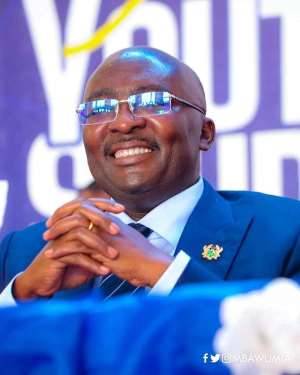The structure, institutions and systems of Ghana's national economy are the decisive drivers that hinder the socio-economic progress of the country. It can be argued that anything other than solving this fundamental problem will only provide an artificial solution to our challenges.
I vividly recall Nana Akufo Addo (as he then was) when he delivered his keynote address at the 3rd Business Law Conference of the Nigerian Bar Association (NBA) on March 26, 2008 in Abuja, poignantly declaring that “the foundation of business is the existence of strong and independent institutions". A year later, President Barack Obama (as he then was) reinforced this belief by declaring that "Africa needs strong institutions, not strong men."
Vice President, Dr. Mahamudu Bawumia, recently echoed similar sentiments at the unveiling of the Ghana Electronic Pharmacy Platform (ePharmacy) when he said among other things that “…ultimately, we must all remember that you cannot transform the economy with bricks and mortar alone. You can only transform the economy with ideas, systems and institutions."
The arguments advanced by these great leaders of our generation recognize the fundamental abnormality in the way nations in our region of the globe have sought to forge the path of their national progress on the backs of weaker institutions and systems. Dr. Bawumia understood the situation in line with his advocacy and clear vision in dealing with this crucial issue. As far as I can tell, his approach to solving problems stems from confronting them from the bottom up through a comprehensive root cause analysis.
Dr. Bawumia has over the years made truly ambitious efforts to redefine and unlock our economy using digitization to strengthen our institutions and systems in building a new Ghana that deserves the title of “Gateway to Africa”. He is a man of extraordinary ideas and his leadership and expertise are rightly required for our country's next major agenda.
Arguably, the most significant strategy to address the structural deficiencies in our institutions and systems is to reduce their human interface and formalize them with innovative technologies through a well-structured digitization framework. While digitization strengthens our institutions and systems, it also makes life easier for all Ghanaians.
We can build effective institutions and systems by increasing productivity-output, removing bureaucratic obstacles, deepening efficiency and confronting corruption. In fact, no country has achieved monumental growth with weaker institutions and systems. Thus, bricks and mortar are by no means sufficient to accelerate economic growth and must be balanced by strong institutions and systems that give impetus to a nation's capacity.
My days in the UK as a graduate student taught me first-hand how institutions and systems improve not only the economy but also people's lives. As humans, we are ready to engage in comparative analysis with many developed countries. But we have forgotten that the difference between them and us lies in the robustness of their institutions and systems.
Imagine a Ghana where individuals do not have to queue at an institution to register their businesses, but do so remotely from the comfort of their homes. Imagine a Ghana where every capital city/city/district council can identify every single building in their catchment area from the comfort of their office. Imagine a Ghana where every individual's biometric data is stored in a single database. Imagine a Ghana where the state has access to every individual's records through an integrated database. Imagine a Ghana where you don't need a senior civil servant to help you do some official work. Some of these and other benefits are possible if we improve our institutions and systems to meet global standards.
Dr. Mahamudu Bawumia was arguably the proponent of this systematic transformation strategy. We must collectively embrace this effort because the 4th revolution is here and here to stay! Despite some early successes in Dr. Bawumia's single-minded efforts, his critics have not stopped misrepresenting and attacking him. These criticisms, especially those accusing him of abandoning the economy, may be the result of a genuine misunderstanding or a deliberate ploy. They fail to recognize that national economic prosperity cannot be sustained without stronger institutions and systems.
I am inspired by Dr. Mahamudu Bawumia's understanding of the fundamental challenges facing our country and his unwavering commitment to solving them from the bottom up. As a leader, serving under President Akufo Addo as his second-in-command, he demonstrated wit and bravery in the face of deep-seated challenges that might have deterred others. Therefore, Dr. Bawumia in the next phase to require the executive to implement the necessary reforms that will fulfill the dream of our founding fathers to create prosperity for all.
I sincerely hope that NPP and the rest of Ghanaians will be able to read between the lines when the time comes to make the important decision of who will lead them. Our shared destinies depend on our choice.--
Chief Obosu Mohammed
LL.M MA ACIarb LL.B DPA
obosu.mohammed@gmail.com




No comments yet
Be the first to share your thoughts!